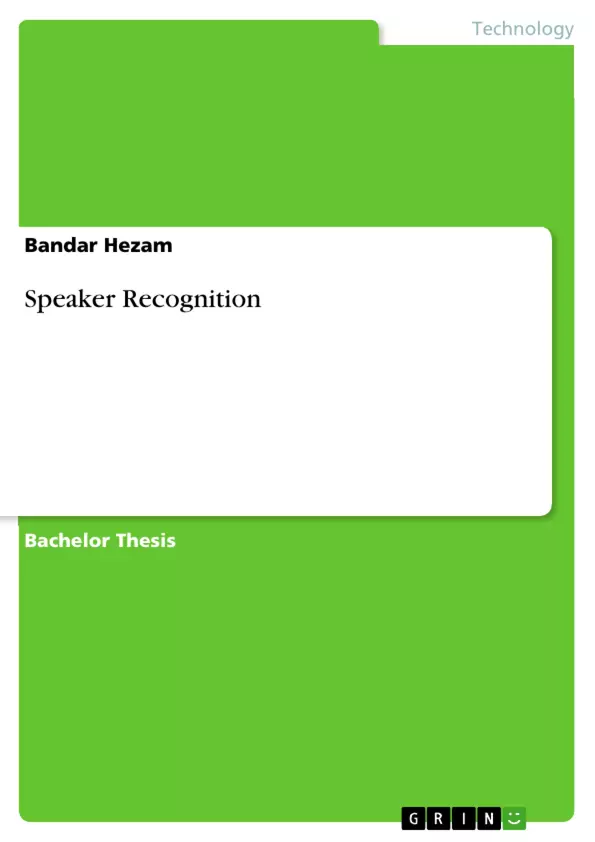
Speaker Recognition
Bachelorarbeit, 2019
26 Seiten, Note: A
Leseprobe
Inhaltsverzeichnis (Table of Contents)
- Introduction
- Theoretical Concepts
- Speaker Recognition
- Classification of Automatic Speaker Recognition
- Speech Feature Extraction
- Objectives
- Design implementation
- Vocal Activity Detection (VAD)
- Speaker Identification
- Frame Blocking
- Widowing
- Mel-frequency Wrapping
- Cepstrum and Feature Extraction
- Distance Calculation
- GUI
- Design innovativeness
- Simulation results
- Train/Enrollment Result
- Recognition
- GUI Result
- Euclidean distance between voices
- Discussion
Zielsetzung und Themenschwerpunkte (Objectives and Key Themes)
This assignment aims to develop a speaker identification system that can accurately identify speakers from a group of people in a recorded audio track. The system utilizes voice activity detection (VAD) to improve speech intelligibility and recognition. Both speaker identification and VAD employ the Mel Frequency Cepstrum Coefficient (MFCC) for voice feature extraction. The main objective is to create a reliable system that allows for speaker identification based on their voice.
- Speaker identification using voice analysis
- Voice activity detection for speech enhancement
- Mel Frequency Cepstrum Coefficient (MFCC) for feature extraction
- Text-independent speaker recognition
- Comparison of speaker characteristics for identification
Zusammenfassung der Kapitel (Chapter Summaries)
The introduction establishes the significance of voice recognition as a social behavior and a key element in speaker identification systems. It outlines the challenges of identifying individual voices within a group recording and introduces the concept of VAD as a solution for improving speech intelligibility. The chapter further explains how MFCCs are used to extract speech features and quantize them for speaker recognition.
The "Theoretical Concepts" chapter delves into the fundamentals of voice recognition, categorizing it into speaker verification and speaker identification. It also introduces the distinction between text-dependent and text-independent voice recognition, explaining the rationale for focusing on text-independent recognition in this assignment.
The "Design Implementation" chapter describes the VAD algorithm and its role in enhancing speech recognition. It then explores the process of speaker identification, including stages like frame blocking, widowing, Mel-frequency wrapping, Cepstrum and feature extraction, distance calculation, and GUI design.
Schlüsselwörter (Keywords)
The key terms and concepts central to this work include speaker identification, voice activity detection (VAD), Mel Frequency Cepstrum Coefficient (MFCC), speech feature extraction, text-independent speaker recognition, and GUI design. These concepts represent the primary focus areas and research themes explored within the assignment.
Details
- Titel
- Speaker Recognition
- Hochschule
- National University of Malaysia (Apu)
- Veranstaltung
- Mechatronics
- Note
- A
- Autor
- Bandar Hezam (Autor:in)
- Erscheinungsjahr
- 2019
- Seiten
- 26
- Katalognummer
- V1420967
- ISBN (Buch)
- 9783346980236
- Sprache
- Englisch
- Schlagworte
- Designing a speaker,
- Produktsicherheit
- GRIN Publishing GmbH
- Preis (Ebook)
- US$ 16,99
- Preis (Book)
- US$ 19,99
- Arbeit zitieren
- Bandar Hezam (Autor:in), 2019, Speaker Recognition, München, Page::Imprint:: GRINVerlagOHG, https://www.diplomarbeiten24.de/document/1420967
- Autor werden
- Ihre Optionen
- Vertriebskanäle
- Premium Services
- Autorenprofil
- Textarten und Formate
- Services für Verlage, Hochschulen, Unternehmen

- © GRIN Publishing GmbH.
- Alle Inhalte urheberrechtlich geschützt. Kopieren und verbreiten untersagt.
- info@grin.com
- AGB
- Open Publishing
Der GRIN Verlag hat sich seit 1998 auf die Veröffentlichung akademischer eBooks und Bücher spezialisiert. Der GRIN Verlag steht damit als erstes Unternehmen für User Generated Quality Content. Die Verlagsseiten GRIN.com, Hausarbeiten.de und Diplomarbeiten24 bieten für Hochschullehrer, Absolventen und Studenten die ideale Plattform, wissenschaftliche Texte wie Hausarbeiten, Referate, Bachelorarbeiten, Masterarbeiten, Diplomarbeiten, Dissertationen und wissenschaftliche Aufsätze einem breiten Publikum zu präsentieren.
Kostenfreie Veröffentlichung: Hausarbeit, Bachelorarbeit, Diplomarbeit, Dissertation, Masterarbeit, Interpretation oder Referat jetzt veröffentlichen!
- GRIN Verlag GmbH
-
- Nymphenburger Str. 86
- 80636
- Munich, Deutschland
- +49 89-550559-0
- +49 89-550559-10
- info@grin.com
-









